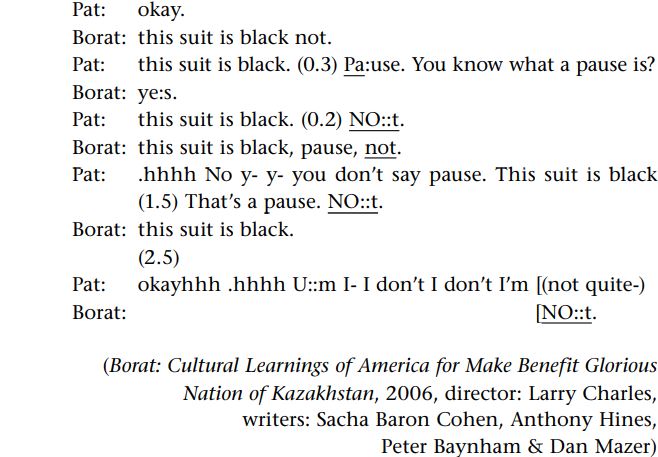


 Grammar
Grammar
 Tenses
Tenses
 Present
Present
 Past
Past
 Future
Future
 Parts Of Speech
Parts Of Speech
 Nouns
Nouns
 Verbs
Verbs
 Adverbs
Adverbs
 Adjectives
Adjectives
 Pronouns
Pronouns
 Pre Position
Pre Position
 Preposition by function
Preposition by function 
 Preposition by construction
Preposition by construction
 Conjunctions
Conjunctions
 Interjections
Interjections
 Grammar Rules
Grammar Rules
 Linguistics
Linguistics
 Semantics
Semantics
 Pragmatics
Pragmatics
 Reading Comprehension
Reading Comprehension|
Read More
Date: 2023-08-30
Date: 21-5-2022
Date: 16-4-2022
|
Reflection: Cooperation and “not-jokes” in American English
We noted earlier that what counts as cooperation in applying the Cooperative Principle depends on the type of activity or talk the participants are engaging in. To engage in joke telling, for instance, requires the contextualization of conversation maxims relative to the genre of joke telling. This genre involves a set of normative expectations that flesh out the Cooperative Principle and maxims in the form of a particular activity type. Take the much maligned subcategory of “not-jokes”, for instance, which originated amongst speakers of American English. This involves the speaker first violating the quality maxim by asserting something which he or she is seemingly committed to, and then explicitly signaling he or she has violated it by uttering “not”. In this way, the speaker makes explicit that he or she is being sarcastic and also implicates that the hearer (or possibly a third party) is someone who is gullible or easily misled.
There are particular expectations, however, about the timing and intonation with which not is delivered for an utterance to count as a not-joke. Consider the following exchange between Borat (a satirical character allegedly from Kazakhstan) and a humour coach in the US.


In order to make the assertion This suit is black to subsequently count as initiating a not-joke rather than being simply a lie or mistaken observation on the part of the speaker, the speaker needs to indicate or signal that the “accepted purpose or direction of the talk exchange” here is to engage in a specific kind of joke telling. This is achieved through delivering the subsequent not with a particular intonation (i.e. with a markedly louder volume and elongation of the vowel sound) and after a “beat” of the conversation has passed (i.e. a pause of approximately 0.2 of a second). In the context of a not-joke, this is what it means to “make your conversational contribution such as is required, at the stage at which it occurs”.
When a speaker flouts a conversational maxim, as in the above examples, it is done in a way that makes the non-observance of the maxim recognizable to others in normal circumstances by blatantly failing to fulfil it (Grice [1975]1989: 49). However, Grice proposed that conversational implicatures can be made available through other ways of not observing the conversational maxims. A number of different frameworks for categorizing different types of non-observance of maxims have been proposed (see, for example, Greenall 2009; Mooney 2004; Thomas 1995), but we will concentrate here on just two of the most important types, namely, violating and infringing the conversational maxims.
Violating a maxim involves deliberate non-observance by the speaker of a maxim in a way that would not be recognizable to others in normal circumstances. In the following example, Rich implicates through his response that he graduated with a degree in maths from Edinburgh University.

This follows from the Quantity2 maxim (“do not make your contribution more informative than is required”) through standard inferences that follow from what is simply described here by Rich in order to maintain the supposition that he is observing the Cooperative Principle. However, Rich does not mention that he left Edinburgh after his first year of study, and so this constitutes a (deliberate) violation of the Quality1 maxim. Violations of maxims thus always involve the speaker intending to mislead others or even lying (Mooney 2004: 914). This intention is a covert one, however, and so differs from the Gricean or communicative intention that we discussed.
Differentiating between these different types of non-observance can be difficult in practice, however, since they rely in part on recognizing the intentions of the speaker, which are not necessarily always clear to others (or even to the speakers themselves). Distinguishing between flouting, violating and infringing maxims thus leads us beyond Grice’s primary focus on what the speaker intended to a consideration of the recognition or reconstruction of the speaker’s intentions by the hearer.
|
|
|
|
تفوقت في الاختبار على الجميع.. فاكهة "خارقة" في عالم التغذية
|
|
|
|
|
|
|
أمين عام أوبك: النفط الخام والغاز الطبيعي "هبة من الله"
|
|
|
|
|
|
|
قسم شؤون المعارف ينظم دورة عن آليات عمل الفهارس الفنية للموسوعات والكتب لملاكاته
|
|
|